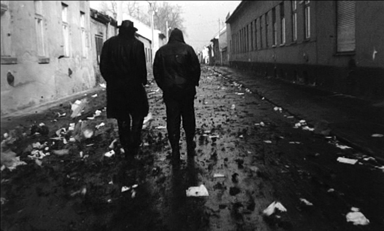art&film
07 May - 05 Jun 2010
ART&FILM
curated by_Josef Dabernig
Béla Tarr, Sátántangó
May 7 – June 5, 2010
Opening: Thursday, May 6, 2010 6 pm
Two dozen existentialistically portrayed desperados step out from the damp and dull horizon of the Hungarian Lowlands, similar to etched incunabulums. Their claim refers to the proverbial perseverance against oneself, against time and space. The protagonists’ usual daily routine, cryptically depicted as coexistence and antagonism, plaintively concocts throughout six chapters full of tragedy and absurdity. With its seven hours run, Sátántangó is regarded as Béla Tarr's opus magnum and as milestone of the film d’auteur. It was first shown in 1994 at the Berlinale and can now be viewed as video transfer every day at Andreas Huber Gallery, which has been transformed into a black box especially for the screening.
In Sátántangó Tarr has lent solitude and stagnation a cinematographic form. The protagonists are the Halics, Horgos, Kráner and Schmidt families; Futaki, Kelemen and Kerekes, Irimiás and Petrina, Estike, Sanyi, the doctor, the headmaster, the host, and a couple of policemen, whose fortunes László Krasznahorkai enmeshed in his same-titled novel published in 1985. Béla Tarr's cinematic interpretation, as it were, visualizes the protagonists in an autistic way, whereby atmosphere and image composition are closely strung together: constantly steamed windows thus become dull projection screens, and continuous rain a metaphor for a society persisting in a morass. With Tarr, cinematic concentration is created as connection of conceptual individualism with an exceptional melancholic-epical strength.
(Josef Dabernig)
Béla Tarr (born 1955 in Pécs, Hungary)
After first experiments in the style of Social Realism, Tarr turned to a strong concentration driven by formal and content criteria at the beginning of the 1980s. From then on, his films are characterised by long shots and abstract images.
Film selection: Kárhozat (Damnation), 1987 – Sátántangó (Satanstango), 1994 – Werckmeister harmóniák (Die werckmeisterschen Harmonien), 2000 – A Londoni férfi (Der Mann aus London), 2007
curated by_Josef Dabernig
Béla Tarr, Sátántangó
May 7 – June 5, 2010
Opening: Thursday, May 6, 2010 6 pm
Two dozen existentialistically portrayed desperados step out from the damp and dull horizon of the Hungarian Lowlands, similar to etched incunabulums. Their claim refers to the proverbial perseverance against oneself, against time and space. The protagonists’ usual daily routine, cryptically depicted as coexistence and antagonism, plaintively concocts throughout six chapters full of tragedy and absurdity. With its seven hours run, Sátántangó is regarded as Béla Tarr's opus magnum and as milestone of the film d’auteur. It was first shown in 1994 at the Berlinale and can now be viewed as video transfer every day at Andreas Huber Gallery, which has been transformed into a black box especially for the screening.
In Sátántangó Tarr has lent solitude and stagnation a cinematographic form. The protagonists are the Halics, Horgos, Kráner and Schmidt families; Futaki, Kelemen and Kerekes, Irimiás and Petrina, Estike, Sanyi, the doctor, the headmaster, the host, and a couple of policemen, whose fortunes László Krasznahorkai enmeshed in his same-titled novel published in 1985. Béla Tarr's cinematic interpretation, as it were, visualizes the protagonists in an autistic way, whereby atmosphere and image composition are closely strung together: constantly steamed windows thus become dull projection screens, and continuous rain a metaphor for a society persisting in a morass. With Tarr, cinematic concentration is created as connection of conceptual individualism with an exceptional melancholic-epical strength.
(Josef Dabernig)
Béla Tarr (born 1955 in Pécs, Hungary)
After first experiments in the style of Social Realism, Tarr turned to a strong concentration driven by formal and content criteria at the beginning of the 1980s. From then on, his films are characterised by long shots and abstract images.
Film selection: Kárhozat (Damnation), 1987 – Sátántangó (Satanstango), 1994 – Werckmeister harmóniák (Die werckmeisterschen Harmonien), 2000 – A Londoni férfi (Der Mann aus London), 2007

